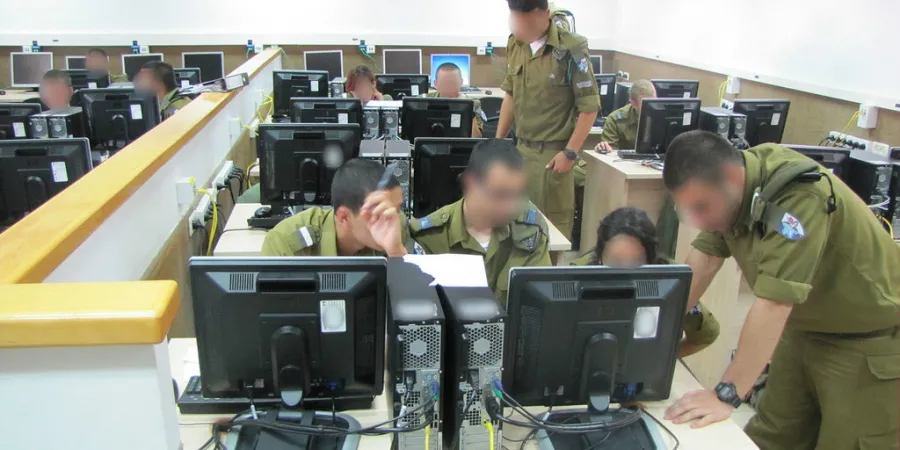The Future of Artificial Intelligence in the IDF
The IDF Sigma branch is focusing on developing artificial intelligence capabilities like machine learning, deep learning, video analysis, and smart chatbots for military applications
IsraelDefense
| 02/07/2017
The data revolution has led to massive amounts of operational data being collected from cameras, microphones, networks, information systems, and devices. The human factor is no longer sufficient, as soldiers cannot physically keep up with the amount of incoming data. To meet this challenge, the IDF has placed great emphasis on AI. The IDF data science teams are working to organize, classify, and use the data to bring valuable insights back to the field and optimize the use of IDF resources.
Led by Lt. Col. Nurit Cohen Inger, IDF's Sigma branch is focusing on developing artificial intelligence capabilities like machine learning, deep learning, video analysis, and smart chatbots for military applications. The branch's purpose is to research, develop, and implement the latest in artificial intelligence and advanced software research.
"The goal is to improve the effectiveness and efficiency of the IDF," she said in an interview to the IDF Blog. "We don’t develop technology for technology’s sake. We look for ways to make a real impact."
For instance, using AI, computers can analyze hundreds of videos at a time and automatically flag suspicious activity. Recent IDF research has shown early promise in using this technology to protect Israel’s borders.
As AI becomes more and more accurate, it will have a greater impact on the IDF’s operational activity. "There are three stages of AI," explained Lt. Col. Cohen Inger. "There is descriptive AI, where the computer can understand the context and identify and classify data. There is predictive AI, where the computer then predicts the impact of the data. Finally, there is perspective AI, where the computer can make intelligent choices based off its predictions. Right now, we’ve mastered the first stage, and are working on more advanced AI."
Developments in Chatbot Technology
Lt. Col. Cohen Inger sees great potential in chatbot development. "The world is moving away from traditional applications to conversational systems. It’s easier to speak to a bot with your natural language, and have it understand and do exactly what you need," she said.
Ultimately, the goal is to create smart chatbots within the IDF’s "Whatsapp-like" messaging application which was developed and released last year. "The chatbots will fully participate and will bring valuable insights to your conversations."
The C4I Directorate is eyeing the future of the "connected soldier." They envision a future where every soldier is equipped with a variety of connected cameras, sensors, and devices. "We’ll be able to know their exact location and medical condition. We’ll have a precise understanding of everything going on in the battlefield," Lt. Col. Nurit Cohen said. "We’ll be able to use AI to analyze all this incoming data and make better-informed decisions."
"It’s a new frontier. It needs to be implemented in steps until it reaches its full potential," Lt. Col. Nurit Cohen concluded.
[Source: IDF Blog]
The IDF Sigma branch is focusing on developing artificial intelligence capabilities like machine learning, deep learning, video analysis, and smart chatbots for military applications
The data revolution has led to massive amounts of operational data being collected from cameras, microphones, networks, information systems, and devices. The human factor is no longer sufficient, as soldiers cannot physically keep up with the amount of incoming data. To meet this challenge, the IDF has placed great emphasis on AI. The IDF data science teams are working to organize, classify, and use the data to bring valuable insights back to the field and optimize the use of IDF resources.
Led by Lt. Col. Nurit Cohen Inger, IDF's Sigma branch is focusing on developing artificial intelligence capabilities like machine learning, deep learning, video analysis, and smart chatbots for military applications. The branch's purpose is to research, develop, and implement the latest in artificial intelligence and advanced software research.
"The goal is to improve the effectiveness and efficiency of the IDF," she said in an interview to the IDF Blog. "We don’t develop technology for technology’s sake. We look for ways to make a real impact."
For instance, using AI, computers can analyze hundreds of videos at a time and automatically flag suspicious activity. Recent IDF research has shown early promise in using this technology to protect Israel’s borders.
As AI becomes more and more accurate, it will have a greater impact on the IDF’s operational activity. "There are three stages of AI," explained Lt. Col. Cohen Inger. "There is descriptive AI, where the computer can understand the context and identify and classify data. There is predictive AI, where the computer then predicts the impact of the data. Finally, there is perspective AI, where the computer can make intelligent choices based off its predictions. Right now, we’ve mastered the first stage, and are working on more advanced AI."
Developments in Chatbot Technology
Lt. Col. Cohen Inger sees great potential in chatbot development. "The world is moving away from traditional applications to conversational systems. It’s easier to speak to a bot with your natural language, and have it understand and do exactly what you need," she said.
Ultimately, the goal is to create smart chatbots within the IDF’s "Whatsapp-like" messaging application which was developed and released last year. "The chatbots will fully participate and will bring valuable insights to your conversations."
The C4I Directorate is eyeing the future of the "connected soldier." They envision a future where every soldier is equipped with a variety of connected cameras, sensors, and devices. "We’ll be able to know their exact location and medical condition. We’ll have a precise understanding of everything going on in the battlefield," Lt. Col. Nurit Cohen said. "We’ll be able to use AI to analyze all this incoming data and make better-informed decisions."
"It’s a new frontier. It needs to be implemented in steps until it reaches its full potential," Lt. Col. Nurit Cohen concluded.
[Source: IDF Blog]



